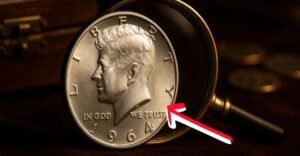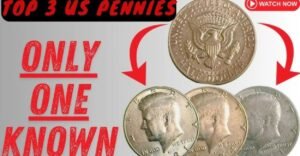Ever dug into a forgotten tin of loose coins from your garage and wondered if one rusty penny could cover your dream house down payment? The Lincoln Wheat Penny – that everyday one-cent piece with the wheat design – holds such secrets, especially its ultra-rare 1943 bronze version, which can fetch a whopping $630,000 at auction. Minted during World War II, this little error coin blends history’s grit with collector gold, and believe it or not, a few might still be mingling in bank rolls or estate hauls. In 2025, as the U.S. potential treasure!
A Simple Intro to the Lincoln Wheat Penny: Everyday Icon with Big Potential
The Lincoln Wheat Penny is the classic brown coin you probably have jangling in your pocket right now – President Abraham Lincoln’s calm face on the front, flanked by two tall wheat stalks on the back. These “wheat cents” rolled out from 1909 to 1958, making them the longest-running U.S. penny design ever. Crafted mostly from copper for that warm reddish hue, they came from three main mint spots: Philadelphia (no small letter), Denver (“D” mark), and San Francisco (“S” mark).
The Gripping Tale: From Birthday Tribute to Wartime Flub
The story starts in 1909, when the U.S. Mint wanted to honor Lincoln’s 100th birthday with his portrait on a coin for the first time – ditching the old Indian Head style for something fresh and personal. Artist Victor David Brenner whipped up the design, even sneaking his “VDB” initials on the back, but public outcry led to a quick tweak, birthing early rarities.
What Skyrockets This Penny to $630,000? Rarity Meets Condition
Most Wheat pennies are dirt cheap, but the 1943 bronze error? It’s the jackpot – only 15-20 known worldwide, making it scarcer than a honest politician joke. That wartime blunder, plus top-notch condition (sharp details, no dings), drives the price. A beat-up circulated one might snag $100,000, but a mint-fresh gem graded MS-65 or better (flawless shine from the factory roll) hits $630,000 at auction.
Why the hype? Condition is everything in numismatics – tiny wear drops value fast, while that original reddish luster screams premium. Recent sales prove it: Collectors pay big for the story and scarcity, especially with inflation making hard assets hot. In 2025, as anniversary fever builds, expect even steeper climbs for rare Lincoln Wheat pennies worth money. It’s not gambling; it’s history with a paycheck.
Hands-On Hacks: Spotting a $630,000 Wheat Penny in the Wild
No pro tools needed – just curiosity and a steady hand! Kick off by raiding your coin jar, snagging penny rolls from the bank (super cheap), or browsing flea markets. Zero in on 1943 dates with the wheat back. For the bronze prize:
- Magnet Magic: Steel ones stick tight; bronze slides right off.
- Weigh It Out: Bronze tips the scale at 3.11 grams; steel’s a feather at 2.7 grams. A kitchen gadget does the trick.
- Eye the Color: Look for warm reddish-brown, not dull silver-gray.
Scan for crisp dates and wheat lines – fakes often blur. Resist the urge to polish; that natural aged glow (patina) adds bucks. Snap pics and hit free apps for quick checks, then ship winners to PCGS or NGC for grading – their expert nod can multiply value overnight. Join a local club for insider tips; the hunt’s half the fun.
Prime Lincoln Wheat Penny Variants to Chase in 2025
The 1943 bronze leads the pack, but the series sparkles with others. Our table spotlights key players, their special quirks, production numbers, and fresh 2025 value ranges (circulated for worn vs. uncirculated for shiny), drawn from auction trends. These bad boys could still surface – keep flipping!
| Variant | Mintage/Key Trait | Circulated Value | Uncirculated Value | Why It’s a Must-Hunt |
|---|---|---|---|---|
| 1943 Bronze Error | ~15-20 known (copper slip) | $100K+ | $300K–$630K+ | Wartime unicorn rarity |
| 1909-S VDB | 484,000 (initials drama) | $700–$1,000 | $5K–$100K | Birthday launch with controversy |
| 1914-D | 1.2 million (low run) | $150–$300 | $2K–$150K | Early scarcity goldmine |
| 1922 No D | Unknown (missing mark) | $500–$1,000 | $10K–$20K+ | Sneaky error easy to overlook |
The Crown Jewel: 1943 Bronze Penny
This copper rebel in a steel year weighs heavy with history. A top-grade sale hit $630,000 – magnet test it first and watch for that red hue.
The Starter Star: 1909-S VDB
San Francisco’s first-year with Brenner’s initials caused a stir. Even worn ones pull $700; pristine? Five figures easy.
Quick Comparison: Common vs. Rare 1943 Pennies at a Glance
Spot the differences fast with this table – it’ll sharpen your eagle eye for the $630,000 chase:
| Trait | Everyday 1943 Penny | Rare Bronze Version |
|---|---|---|
| Material | Steel (zinc-coated) | Copper (bronze-like) |
| Magnet Test | Sticks like glue | No attraction |
| Color | Silvery and dull | Warm reddish-brown |
| Weight | 2.7 grams | 3.11 grams |
| Typical Value | 1 cent | Up to $630,000 |
Savvy Advice from Coin Pros for 2025 Collectors
- Grade It Right: PCGS or NGC stamps fight fakes and amp value.
- Store Smart: Soft holders beat albums – shield from air and light.
- Learn Lean: Grab the “Red Book” guide for year-by-year breakdowns.
- Start Small: Sort common Wheats to build skills before rarities.
Experts say: Focus on condition; it’s the value multiplier. With 2025’s market heat, even modest finds could double quick.
FAQ: Your Burning Questions on the $630,000 Wheat Penny
Why Is the 1943 Lincoln Wheat Penny So Darn Rare?
It was a total accident – copper blanks snuck into steel production during WWII metal shortages, with just 15-20 surviving the scrap heap.
Could I Actually Find One in My Loose Change?
Slim odds, but yeah! Rarities like this have popped from old jars and rolls – sort those pennies!
How Do I Confirm If My Penny’s a Winner?
Magnet and scale first, then pro grading. If it’s non-magnetic 1943 with red tones, get excited.
What’s the All-Time High Sale for a Wheat Penny?
Over $1 million for a flawless 1943 bronze, but $630K is solid for top shapes.
Can Broke Beginners Jump Into Collecting These?
Totally – snag cheap common ones to practice, then level up. Clubs and apps make it free fun.
Conclusion: Raid Your Stash – A $630,000 Wheat Penny Awaits!
The Lincoln Wheat Penny isn’t pocket scrap – it’s a portal to Lincoln’s legacy and WWII whispers, with the 1943 bronze error stealing the show at up to $630,000. From design debuts to mint mishaps, these coins pack stories that pay off for sharp-eyed hunters. In 2025, as collector crowds swell, dump that jar, test with a magnet, and embrace the buzz – your humble cent could crown you king. Dive into clubs, flip those rolls, and share your scores below. What’s your wildest coin hunch? Here’s to unearthing rare Lincoln Wheat pennies worth money – may fortune favor your fingers!




